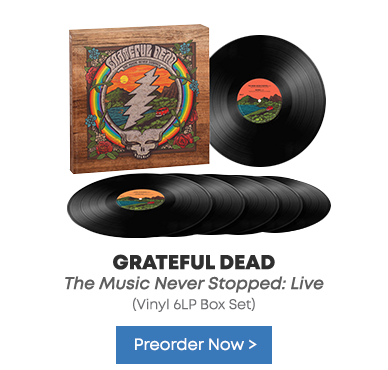Bob Marley & The Wailers' Rastaman Vibration on UHQR 180g 45RPM Clarity 2LP: Limited to 4,500 Copies, Mastered Directly from the Original Analog Master Tapes by Ryan K. Smith at Sterling Sound
When Rastaman Vibration was first released in America in 1976 it did what some in the music industry considered nearly impossible at the time. It took Bob Marley into the Top Ten alongside disco records and corporate rock, points out Rolling Stone, which rates the album 4 stars.
Despite the good cheer of the title track and the upbeat "Roots, Rock, Reggae," Rastaman Vibration contains some of Marley's most intense images of oppression, paranoia and despair. Tracks such as "Who the Cap Fit," "Crazy Baldhead" and "War" are offered by the Wailers with dire urgency as Marley's brutal visions are echoed by his own church choir, the I-Threes. More than four decades later, neither Marley's music nor his message has lost its sting.
For Bob Marley, 1975 was a triumphant year. The singer's Natty Dread album featured one of his strongest batches of original material (the first compiled after the departure of Peter Tosh and Bunny Wailer) and delivered Top 40 hit "No Woman No Cry." The follow-up Live set, a document of Marley's appearance at London's Lyceum, found the singer conquering England as well. Upon completing the tour, Marley and his band returned to Jamaica, laying down the tracks for Rastaman Vibration (1976) at legendary studios run by Harry Johnson and Joe Gibbs. At the mixing board for the sessions were Sylvan Morris and Errol Thompson, Jamaican engineers of the highest caliber.
Of the material on Rastaman Vibration, "War," for one, remains one of the most stunning statements of the singer's career. Though it is essentially a straight reading of one of Haile Selassie's speeches, Marley phrases the text exquisitely to fit a musical setting, a quiet intensity lying just below the surface. Equally strong are the likes of "Rat Race,""'Crazy Baldhead," and "Want More." These songs are tempered by buoyant, lighthearted material like "Cry to Me," "Night Shift," and "Positive Vibration." Not quite as strong as some of the love songs Marley would score hits with on subsequent albums, "Cry to Me" seems like an obvious choice for a single and remains underrated.
This Analogue Productions UHQR is remastered at 45RPM by Sterling Sound's Ryan K. Smith from the original analog master tapes. Each UHQR is pressed at Quality Record Pressings (QRP) using Clarity Vinyl. From the lead-in groove to the run-out groove, there is no pitch to the profile, allowing the customer's stylus to play truly perpendicular to the grooves from edge to center. Every UHQR is hand inspected upon pressing completion. Each UHQR is packaged in a custom clamshell box and will include a booklet detailing the entire process of making a UHQR along with a hand-signed certificate of inspection.
In addition to the UHQR booklet, the package will contain a 8-page 12" x 12" booklet containing new liner notes by musician and Marley biographer Leroy Jodie Pierson as well as exclusive photos by Kim-Gottlieb Walker.
Side 1:
- Positive Vibration
- Roots, Rock, Reggae
Side 2:
- Johnny Was
- Cry To Me
- Want More
Side 3:
- Crazy Baldhead
- Who The Cap Fit
Side 4:
- Night Shift
- War
- Rat Race





































